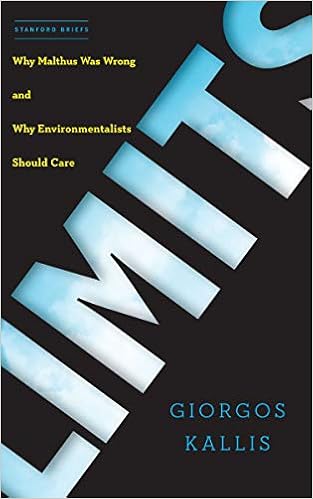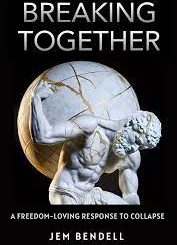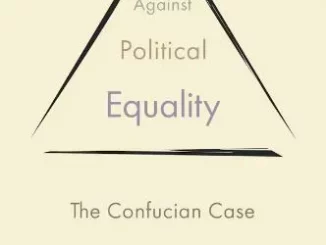Book Review by Andrew J. Sutter

From one point of view, this book is part of the literature about degrowth, a field of study and advocacy that critiques economic growth and, ideally, proposes policies that could replace it as the polestar of our political economy. The author, Giorgos Kallis, is a prominent scholar and advocate in that field. The book offers a welcome expansion of the English-language degrowth literature away from its usual technocratic or homespun focus on economic and environmental concerns, and into the humanities.
But from a more general point of view it’s also an eclectic philosophical exploration of the nature of limits, via an argument that blends mythology, economic history, political philosophy, psychoanalysis, literature and personal reminiscence. Even readers who have never heard of degrowth may find the book’s ideas stimulating, if they have some tolerance for a clearly-written scholarly style of argumentation.
The subtitle of the book is “Why Malthus Was Wrong and Why Environmentalists Should Care.” According to Kallis, the Rev. Thomas Malthus (1766-1834) wasn’t wrong about what most people recall him as being wrong about, namely a supposed prediction that population growth will outstrip our ability to feed everyone. Malthus did indeed assert that food production increases only arithmetically, with acreage and “the industry of the inhabitants” (Malthus 1798, Chap. IV), while population increases at a much faster geometrical (exponential) rate. Moreover, he assumed that people had an essentially unquenchable drive to have sex and reproduce, and that this could not be changed. But as emphasized in in Robert Mayhew’s recent biography of Malthus (Harvard U. Press 2014), contrary to popular belief his point wasn’t to claim that a crisis is coming: rather it was to examine why there hadn’t been one. Mayhew reminds us that Malthus pointed to such reasons as the institution of marriage, the delays in marriage in the middle, and even upper, classes due to economic barriers to be overcome before finding a suitable spouse, and the actual economic difficulties experienced by the poor in raising lots of children: all of these act as checks on population.
Kallis has read Mayhew and takes his points further. He argues that Malthus was justifying the necessity of class differences, which arise from a supposed scarcity of food — after all, it’s the anticipated or actual difficulties in being able to feed a family that keeps the population at a manageable level in a society like England’s. Far from being an ignorant doomsayer who ignored technological advancements (see mention of “industry” above), for Kallis Malthus was a precursor of 20th-21st Century economists, who declare their field to be the study of the allocation of scarce resources. In Malthus’s view, it’s necessary that class differences — and the misery attendant to each class, be it of prolonged celibacy or else hunger and child mortality — continue in order to fend off the disaster of overpopulation and massive food shortage. Therein lies Malthus’s actual error in Kallis’s view: not unfulfilled prophecies of disaster, but doctrines of scarcity and a justification for human unhappiness — or at least, the supposedly necessary unhappiness of *some* human beings.
Kallis’s counterargument may surprise some environmentalists, since superficially it resembles the argument of pro-growth techno-optimists like Peter Diamandis: namely, that we live in a world of abundance. It’s an error, he says, to ascribe scarcity to nature — an error committed not only by Malthus but also by the authors of the “Limits to Growth” and those who promote the “ecological footprint” and “planetary boundaries” discourses. The only reason why some things are considered “scarce” is political decisions we have made about standard of living, production, and other matters. Nature will do just fine regardless of whether we have enough petroleum for fuel, or lithium for batteries, etc. or not.
But the argument then pivots away from its momentary resemblance to techno-optimism and towards a different direction entirely: the ancient Greek ideals of self-moderation. Limits should come from ourselves, not from outside us. Kallis traces this idea in Greek culture, from mythology to Aristotle in the ancient world, through to the ideas of Greco-French philosopher and psychoanalyst Cornelius Castoriadis (1922-1997). This is the most original section of the book, which draws eclectically from Freudian theory, fiction, movies, and reminiscences of Kallis’s late mother and his own childhood. Such breadth seems quite unprecedented in a book about degrowth, of which I’ve read quite a few. But Kallis manages it without being at all excessive or self-indulgent.
Whether the argument is persuasive, and to whom, is another matter. If I were trying to persuade a general audience, I would think Aristotle might be a sufficient philosophical heavyweight. In his Politics, he makes the point that unlike the situation with money, which has no natural limits — a fact that is directly embedded into our modern definition of GDP, the index of economic growth — there is a limit to the stuff we can use. In fact, I made such a point in a book about degrowth I published in Japan a few years ago, and my editor worried that even that was already pretty high-falutin for a general readership. Castoriadis and Freud will almost certainly limit the readership to those with a higher tolerance for scholarly argument. Moreover, Freud’s reputation isn’t what it had been 40 years ago when Castoriadis was writing, and some readers, particularly those mindful of feminist and/or clinical critiques of psychoanalysis, may find he doesn’t add gravity to an argument. Nonetheless, other readers might find it works for them. And although Kallis’s approach is scholarly, his prose is relatively free from jargon and his use of personal reminiscence is often effective.
Aside from this question about the book’s rhetorical strategy, I also had some reservation about the substance of the argument. Kallis makes the interesting point that part of our ideal of infinite economic growth comes from our contemporary attitude that clinging to life at all costs is a worthwhile goal. The self-limiting Greeks, on the other hand, had more acceptance of “the limits marked by death,” and sought to make life useful and happy within the limits set for it (pp. 91ff). The difficulty I have comes from combining this with Kallis’s points that “nature is not a strict mother who imposes limits and tells us what we have to do,” and that “by thinking of limits as something objective out there, we disguise that they are ultimately about us and our own wants” (p. 60).
First, it’s hard to get guidance from these principles about how we should think about future generations, and what steps if any we should take to preserve any particular features of the planet for them. Should our acceptance of death pertain only to our individual selves, or can it extend to humankind as a whole? E.g., would it meet the Greek ideals to try to raise the material standard of living of everyone in this and the next generation on the planet, even if subsequent generations would die off from climate change? Is it legitimate for us to make decisions in the present based on our acceptance not only of our own deaths but of the deaths of people in the future?
Second, the approach seems too anthropocentric. To me it seems hard to deny that we humans have duties to other forms of life whose habitats we are destroying by land use and climate change, and whose guts we are filling with plastic and other toxins. If limits are “about us and our own wants,” what room is there for these duties? Is their existence entirely a matter of our personal taste? Moreover, it seems hard to deny that there are natural limits, “objective” and “out there,” pertinent to the survival of these creatures, unless we are to take the attitude that we can sit in judgment over all life forms on this earth. I hope these substantive ethical issues will be addressed more extensively in future writings from this author.
Despite these reservations, this book is a very fine example of the sort of depth the environmental humanities can bring to an issue. It’s nice to see this sort of interdisciplinary meditation on growth and on limits appearing in English. I hope the author will continue in this vein.
Andrew J. Sutter teaches at Akita International University and Keio University Law School in Japan. He is the author of, among other things, The End of the Myth of Economic Growth [in Japanese] (Kodansha Gendai Shinsho 2012), and the working paper “The Birth of ‘Décroissance'” (available on SSRN, 2017)
If you wish to listen to a podcast by Giorgos about his book, please go here
Limits: Why Malthus Was Wrong and Why Environmentalists Should Care by Giorgos Kallis
Publisher: Stanford University Press
ISBN: 978-1503611559




Be the first to comment